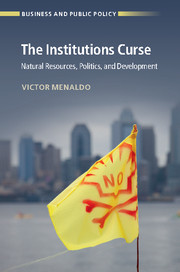Book contents
- Frontmatter
- Dedication
- Contents
- List of figures
- List of maps
- List of tables
- Acknowledgments
- 1 Introduction
- 2 Three puzzles and some building blocks
- 3 Intellectual heritage of the institutions curse view
- 4 The institutions curse theory
- 5 Not manna from heaven after all: the endogeneity of oil
- 6 The resource blessing
- 7 Oil curse or monarchical exceptionalism?
- 8 Conclusions
- References
- Author index
- Subject index
3 - Intellectual heritage of the institutions curse view
Published online by Cambridge University Press: 05 August 2016
- Frontmatter
- Dedication
- Contents
- List of figures
- List of maps
- List of tables
- Acknowledgments
- 1 Introduction
- 2 Three puzzles and some building blocks
- 3 Intellectual heritage of the institutions curse view
- 4 The institutions curse theory
- 5 Not manna from heaven after all: the endogeneity of oil
- 6 The resource blessing
- 7 Oil curse or monarchical exceptionalism?
- 8 Conclusions
- References
- Author index
- Subject index
Summary
This chapter traces the intellectual pedigree of the key ideas that animate this book. Its purpose is to give readers a fuller sense of where the book's innovations begin and where its lack of originality ends. In doing so, this chapter clarifies my debts to earlier contributions and pays homage to a gaggle of intellectual forbearers.
I have benefited from others’ research in two main ways. The first is in regards to my desire to undertake a critical reanalysis of the resource curse theory and the larger fiscal contract paradigm that spawned it. The second is in regards to my attempt to construct an alternative theory that can make better sense of the patterns and stylized facts that these approaches grapple with. Therefore, this chapter provides a panoramic view of the literature on the political economy of natural resources that is informed by criticisms of the resource curse theory and several responses to those criticisms.
This chapter also reconsiders the fiscal contract approach to political and economic development by leaning on several previous works that call into question its main premises and conclusions. This includes an eclectic literature on neo-mercantilism. It also includes the factor endowment approach to explaining institutional origins.
The neo-mercantilist approach to political economy is centered on the idea that some states face difficulties generating public revenues through regular taxation sources. It suggests that fiscal monopolies, crony capitalism, and politicized finance help to kill two birds with one stone. They provide an incumbent's political allies with valuable rent-seeking opportunities while simultaneously generating easy-to-collect revenues for the state.
Exposure to this body of work has been helpful to me because it is compatible with the idea that natural resources are endogenous. It suggests a strong motive for why governments would seek to cultivate hydrocarbon sectors and mining even if knowledge of geological potential remains shaky and the international price of commodities is in the dumps, namely, to quickly generate as many revenues as possible. And it suggests a context under which this gamble would make sense – when it is hard for the state to tax other stuff.
- Type
- Chapter
- Information
- The Institutions CurseNatural Resources, Politics, and Development, pp. 43 - 76Publisher: Cambridge University PressPrint publication year: 2016



